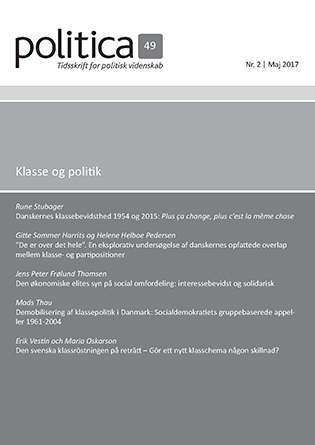Swedish class voting in decline: Does a new class schema make a difference?
DOI:
https://doi.org/10.7146/politica.v49i2.131265Resumé
In the light of observations of the decline in class voting, some scholars have suggested that the class variable should be reconstructed in a way that makes post-industrial labor market trends more visible. A leading proponent of this view is Daniel Oesch. In this article we compare the development in class voting according to his class schema compared to a more traditional one, in the Swedish National Election Studies 1968-2014. The results show that the schemas give remarkably similar results, that Oesch’s schema is not markedly better at predicting voting for newer political parties, and that the development in the distribution of positions in the labor market does not make a big difference for the strength of class voting. We discuss the implications of these findings.
Publiceret
Citation/Eksport
Nummer
Sektion
Licens
LicensOphavsretten tilhører Politica. Materialet må ikke bruges eller distribueres i kommercielt øjemed.





